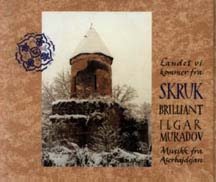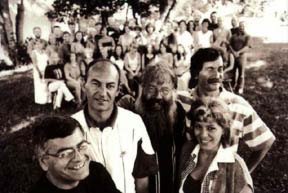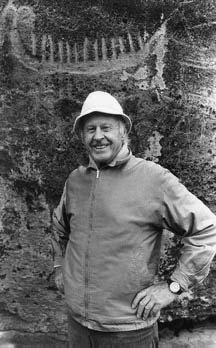|
Azerbaijan's
Primal Music by Steinar Opheim
"The Land We Came From"
(Landet vi kommer fra) is the title of the collaboration between
Azeri musicians, the Norwegian Choir SKRUK, the Norwegian company
"Kirkelig Kulturverksted" and the Norwegian Humanitarian
Enterprise, an organization which has been working with refugees
in Azerbaijan since January 1994. This sound is overlaid with solos by Azerbaijani singers Brilliant Dadasheva and Ilgar Muradov. Galib Mammadov was project coordinator amd a music arranger, and Siyavush Karimi was co-producer, arranger, and orchestrator.
Photo: Azerbaijani musicians, clockwise: Galib Mammadov, Ilgar Muradov, Per Oddvar Hildre, Siavush Karimi and Brilliant Dadasheva. Mammadov finds support for these theories. "For a long time I thought that Thor Heyerdahl's theories were pure fantasy. Now I'm convinced they aren't. Our mugham musicians were quite surprised when they saw a film about the original Norwegians - the Laps. 'This is our music and culture,' they said. Many of the expressions in our art and culture are similar to those we found in Norway," Mammadov observed. He was surprised how well the SKRUK choir could sing Azerbaijani folk melodies. Visit to Azerbaijan
And that's the reason 45 singers of SKRUK came to Azerbaijan in March of 1997. For ten days, they traveled around the country, visiting cities and villages. Usually, they stayed overnight in private homes in order to catch a closer glimpse of Azeri life. Photo: Thor Heyerdahl, famous Norwegian archeologist, who believes Scandinavian ancestors came from the region of Azerbaijan One trip they won't ever forget was to the village of Lahij in the Greater Caucasus mountains, a few hours north of the city of Ismayilli. The journey, made in a small military bus, was a treacherous, hair-raising experience. The dirt road, which hugs the side of the mountain, was slippery from spring rains, and there are no guard rails to keep vehicles from sliding off the road and plunging into the river 150 meters below. However, once the choir finally arrived safely at the top of the mountain, they were treated like royalty at the home of the village leader. It was an memorable event for everyone. SKRUK also gave concerts in Baku, Shaki and Ganja. The more they became familiar with Azeri culture, the more their interest and motivation for the project grew. "It was the Norwegians' idea to make this CD," said Brilliant Dadasheva. "We were excited that they wanted to sing our folk songs." Brilliant, a well-known and popular soprano vocalist, sings with the Symphony Orchestra of the Azerbaijan National Television. She graduated from the Azerbaijan National Culture and Arts Institute in 1990. It's an interesting coincidence how SKRUK came to choose Brilliant. Back in the spring when they were traveling around the countryside in search of soloists, they discovered her when they were sitting in a tea house (chaikhana) in one of the outlying provinces in the countryside. She was performing on Baku TV The Making of the CD How did the Norwegians and Azerbaijanis communicate with each other that month when they were together, recording and touring? "Mostly, through music," said Brilliant, who admitted her English wasn't too good. Siyavush commented that even though SKRUK is officially an "amateur" organization as all the choir members support themselves financially through other jobs, they perform on an extremely high professional level. "SKRUK choir loves to sing," said Siyavush, a first-class musician himself who graduated from Azerbaijan's Academy of Music in 1977. The CD cover features a photo of one of most ancient churches in Kish, a village near Shaki in the northwest region of Azerbaijan. Oral tradition says that this church was built in the year 78 AD by Yelisey, a disciple of Jesus' brother. If true, this would make the Christian church in Kish one of the oldest in the world. Azerbaijani archaeologists, however, have their doubts and suspect that it dates only to the 3rd century. Per Oddvar Hildre, SKRUK's director commented, "There's no doubt that we have much to learn from Azerbaijanis. We found the mugham tradition to be very interesting. At first, it sounded a bit strange but, gradually, we grew to appreciate its beauty. When you listen to the same melodies over and over again, you always find interesting, new elements. We found the Azeris receptive to new musical combinations. They welcomed us with open arms." Hildre stresses that SKRUK is not trying to imitate Azeri music in this CD. The choir sings music in its own way as do the Azeri folk singers. "The important thing here is that two musical traditions and cultures have come together to make a new creation," says Hildre. "The experience also provided us with an invaluable glimpse of a culture that may be our long-forgotten homeland." Whether it's true or not that Norwegians descended from Azerbaijanis, SKRUK's quest to discover their roots has resulted in a vibrant collection of bilingual, bicultural renditions of the Azeri folk songs. It's another first in the cultural history of Azerbaijan. UP1. The tar, saz, ud and kamancha are all stringed instruments. The tar, saz and ud are plucked; kamancha is played with a bow. The tutak and balaban are wind instruments. Tutak is a member of the flute family. Balabans can be played in duet to resemble the sound of a bagpipe. Garmon is somewhat like an accordion. Nagara and gosha nagara are percussion instruments in the drum family. Nagara is played with the bare hands. Gosha nagara means double drum and is played with drum sticks. The SKRUK CD can be ordered from Norway at Norwegian Santal Mission, P.O. Box 9219, Groenland, N-1034 Oslo, Norway. Tel: (47-22) 57-86-00 or Fax: 67-93-35. To find where the CD can be ordered in other countries, contact Reidar Saunes, Market Manager, Kirkelig Kulturverksted in Norway. Tel: (47-22) 55-84-00 or Fax: 55-58-69.
|



